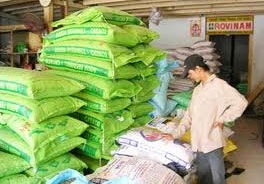Feeding the hunt for feed solutions
 |
| illustration photo |
A foreign newswire recently said Indian businesses would stop exporting corns and soybean residues to Vietnam after Vietnam demanded re-exporting around 50,000 tonnes of animal feed imported from India due to quality matters in early February, 2011.
“I think this was simply a warning among relevant businesses. There is yet to have any official information about it from Indian government,” said Vietnam Animal Feed Association chairman Le Ba Lich.
He also noted that Vietnamese companies should be calm as India also needed to boost sales of its agricultural products.
Animal Production Processing and Import Export Joint Stock Company general director Doan Trong Ly said the firm received no feedback from its Indian business partners about their intention to stop exporting corns and soybean residues to Vietnam.
Vietnam is reportedly one of Indian biggest animal feed importers. Indian animal feed has lower prices than that in some other markets, however its quality is unstable as many batches were found with some kinds of worms which may harm production.
Therefore, the Ministry of Agriculture and Rural Development’s (MARD) Plant Protection Department enacted Dispatch 1616/BVTV-KD dated September 20, 2010 requiring stricter control of such imported agricultural produce.
“Quick enforcement of Dispatch 1616 (two months after enactment) drove local importers into a dilemma as many import shipments had to be re-exported, causing businesses huge losses,” said Lich.
In the fourth quarter of 2010 nearly 50,000 tonnes of animal feed imported from India had to be re-exported after some forbidden kinds of worms were found in these products. Importers incurred losses of $16-20 million.
In early 2011 additional 44,500 tonnes of corns and soybean residues were in the same position for a similar reason.
Amid sharp responses from local importers and Indian exporters, these shipments were later allowed by the MARD to be sterilised and gone through customs checks on February 17.
Importers, however, incurred losses of hundreds of thousands of US dollars associated with storage fees at ports and sterilisation fees.
Lich said enactment of Dispatch 1616 was important, but it needed to be amended to avoid causing losses to businesses. In his mind, shipments arrived in Vietnam's ports would be allowed to be sterilised before making customs check if they contained harmful worms.
Besides, the Vietnam Animal Feed Association asked animal feed importers to require their Indian business partners to ensure their products exported to Vietnam must be worm free and they would bear all losses if their export shipments were later found with harmful worms.
India provides around 30 per cent of animal feed for Vietnam. In 2010, Vietnam imported from India 812,759 tonnes of soybean resides worth $398,069 and around 400,000-500,000 tonnes of corn valued at around $108 million.
Animal feed imported from India enjoys prices $35-40 per tonne lower than that imported from the US or Argentina.
What the stars mean:
★ Poor ★ ★ Promising ★★★ Good ★★★★ Very good ★★★★★ Exceptional
Related Contents
Latest News
More News
- Hermes joins Long Thanh cargo terminal development (February 04, 2026 | 15:59)
- SCG enhances production and distribution in Vietnam (February 04, 2026 | 08:00)
- UNIVACCO strengthens Asia expansion with Vietnam facility (February 03, 2026 | 08:00)
- Cai Mep Ha Port project wins approval with $1.95bn investment (February 02, 2026 | 16:17)
- Repositioning Vietnam in Asia’s manufacturing race (February 02, 2026 | 16:00)
- Manufacturing growth remains solid in early 2026 (February 02, 2026 | 15:28)
- Navigating venture capital trends across the continent (February 02, 2026 | 14:00)
- Motivations to achieve high growth (February 02, 2026 | 11:00)
- Capacity and regulations among British areas of expertise in IFCs (February 02, 2026 | 09:09)
- Transition underway in German investment across Vietnam (February 02, 2026 | 08:00)

 Tag:
Tag:


















 Mobile Version
Mobile Version